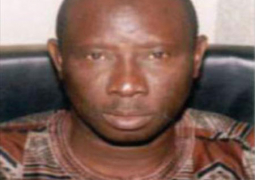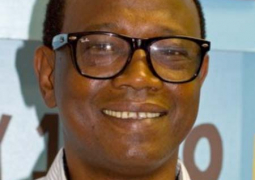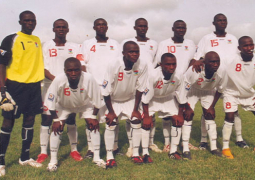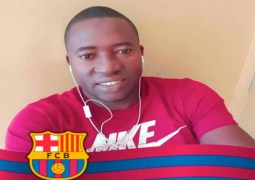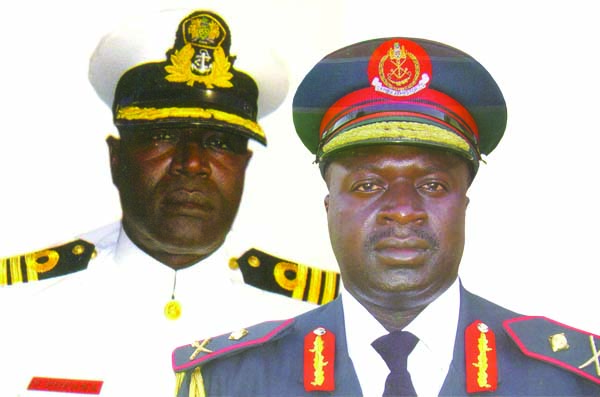
The Director of Special Litigations at the Attorney General's Chambers, Daniel O. Kulo, yesterday addressed the Special Criminal Court in
DSL D.O. Kulo, whose submission took nearly two and half hours, urged the court presided over by Justice Ikapala to convict the accused persons on all the four counts preferred against them by the state, adding that the prosecution had discharged the burden of proof in the case by calling in five prosecution witnesses, whose evidence was quite sufficient to secure a conviction.
In his marathon address before a packed court room, Kulo said: "My lord, the two accused persons are jointly charged on a four-count indictment including conspiracy and treason, and the 1st accused (Tamba) is charged alone on count four and three. The information, by the records, stated that a plea of not guilty was taken on 16 June 2010."
He adduced that a plea was taken by virtue of section 24 sub-section 8A of the 1997 constitution of The
On that point, Kulo told superior court that the prosecution discharged the burden by calling five witnesses and tendered in court exhibits A,B and C at the closure of its prosecution case, adding that the defence relied on section 24 sub section 8 of the 1997 constitution, which he read in court.
"The question to be determined by the court, at this stage, is whether the prosecution proved the guilt of the accused persons as required by law. Its starts with count one conspiracy, and the law enjoined that the state shall prove the following elements: that there was an agreement to do a thing; the thing agreed between them if done must be unlawful or illegal," he submitted.
He adduced that the state must prove that the accused persons participated or agreed, and it is expected that everybody would be present at that time.
In respect of conspiracy, DO Kulo referred the superior court to the case of Amadou Badjie and two other versus the state, which he said is a Gambia Court of Appeal decision reported in Gambia Court of Appeal digest Volume one, page five to six, which he also read in court in support of his argument.
What matters here, Kulo added, is agreement, while drawing the court’s attention to the Nigeria Supreme Court ruling reported in 1973 in all Nigeria Law report.
DSL Daniel O. Kulo also drew the court’s attention to exhibit C, which was the statement of Yahya Darboe, a life convict, who according to him (Kulo) gave a graphic description of how the 1st accused gave him a free ride in his car in which the 2nd accused was also present.
"How he impressed fear," Kulo stated.
He continued to submit that the statement of the 2nd accused, by giving support to the agenda and the action, indicated that there was an agreement in mind.
The senior state prosecutor in his submission also referred the court to the evidence of the 1st prosecution witness, Major M.A. Bah, which he said gave a graphic description on the information about how the coup was planned, and rushed for an intervention from the 1st accused and how the first accused dismissed him and labeled him as crazy.
He also drew the court's attention to exhibit A, the statement of the 1st accused, which he wrote on page 11 line five to 8, which according to him, show the tactics used to ensure that the agreed mission succeeds.
"The action of the 1st accused was a mere tactic to leave, and he restricted the arresting team that went for Ndure Cham by telling the arrestees to call him when they reach his (Ndure Cham's) house. The arresting team was fooled by the 1st accused," Kulo submitted.
DSL Kulo also submitted that exhibit C forms part of the case of the prosecution, elucidating that the court is duty bound to consider that statement as part of evidence legally placed. He also referred the court to another Nigeria Supreme Court decision.
He then urged the court to convict the accused persons on count one, as the prosecution proved its case.
On the second count, Kulo added: "It deals with endeavour to stage a coup, the evidence of which is contained in exhibit C, the statement of Yahya Darboe, the oral testimony of PW1, M.A. Bah and the tactics adopted by the 1st accused to enable Ndure Cham to escape, which can be found on page 11 of the 1st accused statement."
"I told Sering Modou Njie not to inform the President until the two men are arrested," DO Kulo quoted Lang as saying in his statement.
"This area deals with the operational movement of troops of the Gambia Armed Forces and the appointment of key officers and commanders. The appointment of key commanders in key posts should not be done by the 1st accused, it can only be done by the President of the Republic of The
He also referred the court to section 61 subsection 1 of the 1997 constitution, which he read, and also cited section 188 sub section (1)(2) of the same constitution.
He cited section 190 subsection C of the 1997 constitution, adding that an officer in the Gambia Armed Forces who carried out the duties and operational movement of troops is simply carrying out the duties of the President of the Republic.
"My lord, when you compare this with the evidence of PW5, Yayha Darboe, you would unequivocally conclude that this was a coup that PW5 was to execute in finality. If you look at exhibit C, you will see the initial agreement between the 1st and 2nd accused persons, and the 1st accused was acting with the 2nd accused."
"I urged my lord to hold that there is sufficient evidence to secure the conviction against the accused persons," he added.
On the third count, DSL DO Kulo said it deals with concealment, and the essential ingredients are that the accused persons had information about the coup, but they failed to alert an official of the government in the like of a magistrate, police officer or minister.
"They had sufficient information about the coup. See the evidence of PW1 and exhibit C and page 1to 4 of the statement of the 1st accused (exhibit A). The other question was did they fail to alert officials of government. My lord, they did not alert any government official be it magistrate or minister," he submitted further.
On page 10, line 4 to 5 of exhibit A, the 1st accused purported to have alerted the police chief, but of the same time tied the hands of the police chief which amounts to giving no information.
"The delay in tactics adopted by the 1st accused can only be unfair to the persons who were supposed to carry out the arrest of those involved in the coup," Kulo told the court.
He urged the court to rely on circumstantial evidence to convict the accused persons.
On count four, Kulo adduced that it deals with failing to take reasonable steps, while convincing the court to look at the totality of the evidence of PW1, and also exhibit A, the statement of the 1st accused.
According to Kulo, the 1st accused gave the impression that he alerted to inform the President, and relayed the information to one Matarr Jarju, said to be the head of security at State House.
"My lord, when you compared this, you would come to conclusion that both accused persons, after having the information about the coup, failed to inform the President about it," he submitted.
Kulo asked why the 1st accused, while giving instructions to arrest the coup suspects, failed to inform the President, adding that no reasonable step was taken, in the circumstances, on the matter.
"Evidence as contained in exhibit A, shows that the President and the 1st accused could have communicated on phone. With this, my lord, it is sufficient to convict the accused persons," he added.
He said that in the light of the above, and the legal issues and principles cited show that the prosecution had proved their case beyond reasonable doubt, as required by law.
At that juncture, the defence counsel representing the accused persons asked for an adjournment, in order for them to address the court.
The case was adjourned until 21st March 2011 for the defence to address the court.
Readers would recall that the prosecution in order to prove a prima facie case against the accused persons had called in six prosecution witnesses including Major Momodou Alieu Bah, formerly convicted for treason, but subsequently pardoned and now reinstated in the army, Modou Manneh, security operative, Timothy Sanyang, another senior military officer, Momodou Sowe, a police officer attached to the major crime unit of the police force who narrated how he obtained the cautionary and voluntary statements from the accused persons, ex-Captain Bunja Darboe, a life sentence serving convict and Yahya Darboe, also a life sentence serving convict, who was convicted for his alleged role in the 2006 coup.
During proceedings, the prosecution led by Daniel O. Kulo, also tendered the cautionary and voluntary statements of both accused persons as exhibits.
Fofana was the president of the General Court Martial which convicted and sentenced 10 men to various prisons terms ranging from 10 years to life imprisonment for their roles in the 2006 coup plot.


